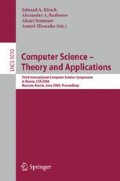Abstract
The principal result of Justification Logic is the Realization Theorem, which states that behind major epistemic modal logics there are corresponding systems of evidence/justification terms sufficient for reading all provable knowledge assertions as statements about justifications. A knowledge/belief modality is self-referential if there are modal sentences that cannot be realized without using self-referential evidence of type “t is a proof of A(t).” Building on an earlier result that S4 and its justification counterpart  describe knowledge that is self-referential, we show that the same is true for
describe knowledge that is self-referential, we show that the same is true for  ,
,  , and
, and  with their justification counterparts whereas for
with their justification counterparts whereas for  and
and  self-referentiality can be avoided. Therefore, no single modal axiom from the standard axiomatizations of these logics is responsible for self-referentiality.
self-referentiality can be avoided. Therefore, no single modal axiom from the standard axiomatizations of these logics is responsible for self-referentiality.
Access this chapter
Tax calculation will be finalised at checkout
Purchases are for personal use only
Preview
Unable to display preview. Download preview PDF.
References
Artemov, S.N.: Operational modal logic. Technical Report MSI 95–29, Cornell University (1995)
Artemov, S.N.: Explicit provability and constructive semantics. Bulletin of Symbolic Logic 7(1), 1–36 (2001)
Artemov, S.N.: Justification logic. Technical Report TR-2007019, CUNY Ph.D. Program in Computer Science (2007)
Brezhnev, V.N.: On explicit counterparts of modal logics. Technical Report CFIS 2000–05, Cornell University (2000)
Brezhnev, V.N., Kuznets, R.: Making knowledge explicit: How hard it is. Theoretical Computer Science 357(1–3), 23–34 (2006)
Fitting, M.: The logic of proofs, semantically. Annals of Pure and Applied Logic 132(1), 1–25 (2005)
Kuznets, R.: Complexity Issues in Justification Logic. PhD thesis, CUNY Graduate Center (2008)
Pacuit, E.: A note on some explicit modal logics. In: Proceedings of the 5th Panhellenic Logic Symposium, Athens, Greece, July 25–28, 2005, University of Athens (2005)
Rubtsova, N.: Evidence reconstruction of epistemic modal logic S5. In: Grigoriev, D., Harrison, J., Hirsch, E.A. (eds.) CSR 2006. LNCS, vol. 3967, pp. 313–321. Springer, Heidelberg (2006)
Wansing, H.: Sequent calculi for normal modal propositional logics. Journal of Logic and Computation 4(2), 125–142 (1994)
Author information
Authors and Affiliations
Editor information
Rights and permissions
Copyright information
© 2008 Springer-Verlag Berlin Heidelberg
About this paper
Cite this paper
Kuznets, R. (2008). Self-referentiality of Justified Knowledge. In: Hirsch, E.A., Razborov, A.A., Semenov, A., Slissenko, A. (eds) Computer Science – Theory and Applications. CSR 2008. Lecture Notes in Computer Science, vol 5010. Springer, Berlin, Heidelberg. https://doi.org/10.1007/978-3-540-79709-8_24
Download citation
DOI: https://doi.org/10.1007/978-3-540-79709-8_24
Publisher Name: Springer, Berlin, Heidelberg
Print ISBN: 978-3-540-79708-1
Online ISBN: 978-3-540-79709-8
eBook Packages: Computer ScienceComputer Science (R0)

